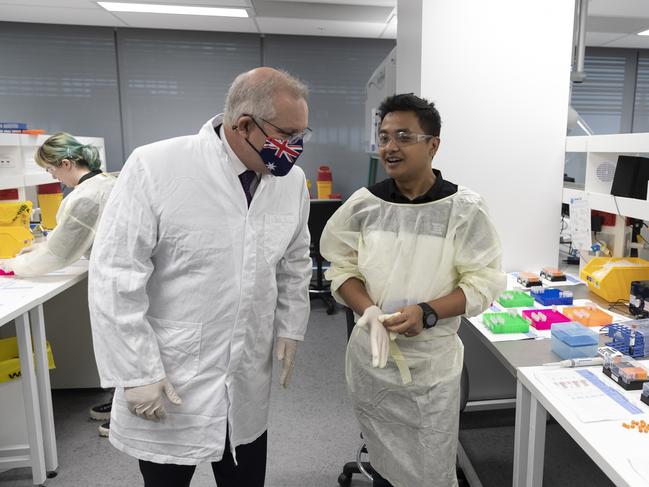Pfizer, BioNtech COVID-19 vaccine explained: How it will affect you
Researchers have taken a huge leap forward to develop a COVID-19 vaccine, with millions of doses secured for Australians. These are your questions answered.
Coronavirus
Don't miss out on the headlines from Coronavirus. Followed categories will be added to My News.
Researchers have taken a huge leap forward in the race to develop a coronavirus vaccine, with millions of doses secured for Australians. Here’s everything you need to know.
WHAT HAVE PFIZER AND BIONTECH DISCOVERED?
The pharmaceutical company and German biotech giant have discovered positive early results from a phase 3 clinical trial of their coronavirus vaccine.
In looking at 94 cases of COVID-19 in trial participants, they found after they received two shots of either the vaccine or the placebo, the vaccine was more than 90 per cent effective at seven days after the second dose.
The team said their results suggest protection against the virus is achieved 28 days after the first vaccination.

WHO WAS INVOLVED IN THE STUDY?
The Phase 3 clinical trial of BNT162b2 began on July 27 and has enrolled 43,538 participants from six countries to date, 38,955 of whom have received a second dose of the vaccine candidate as of November 8. Approximately 42 per cent of global participants and 30 per cent of American participants have racially and ethnically diverse backgrounds.
WHAT IS AN MRNA VACCINE?
Conventional vaccines use a weakened form of the virus to prompt an immune response but mRNA vaccines use the virus’s genetic code to make a person’s own cells produce vaccine antigens and generate immunity.
HOW DOES THIS VACCINE WORK?
It enables the production of “spike proteins” that sit outside of coronavirus. The vaccine introduces this mRNA to the body, triggering human cells to produce the spike protein. The body produces antibodies, and other immune pathways to stop infection. It does not have the virus in the dose, making it faster to produce.
This new age vaccine technology has never been used in humans before but it is a much quicker way to make a vaccine.
Nucleus Network’s Paul Griffin has trialled a number of Mrna flu vaccines in humans with no untoward side effects.
“It’s not gene therapy, is not able to be incorporated into the host genome so there’s absolutely no prospect of altering human DNA using the vaccine,” he said.
“It really is very specific in terms of what it can do. It can make the antigen to the virus so hopefully we get an immune response, but it can’t do any of those other things that that people have been worried about it certainly can’t integrate into the host genome or anything like that,” he said.
ARE THERE ANY SIDE EFFECTS?
The researchers involved have not seen any safety issues so far.
THE PFIZER VACCINE IS 90 PER CENT EFFECTIVE. WHAT DOES THIS MEAN?
The flu vaccine we receive every year is only 60 per cent effective at preventing the flu so 90 per cent effective is good. However, it is important to note proving the vaccine is effective at preventing the illness COVID-19 is not the same as proving it prevents the spread of the virus SARS- CoV-2 which causes the disease. Unless the vaccine also prevents the spread of the virus people may not get ill but the virus will still be circulating experts have cautioned. “Even so reducing clinical infection will also go a long way to reducing transmission,” says Nucleus Network’s Paul Griffin who is trialling a number of COVID-19 vaccines.
WILL THE TRIAL CONTINUE?
Yes. It will continue through to final analysis of 164 confirmed cases to collect more data about the effectiveness of the vaccine. The study also will evaluate the potential for the vaccine candidate to provide protection against COVID-19 in those who have had prior exposure to SARS-CoV-2, as well as vaccine prevention against severe COVID-19 disease.
WHAT ARE THEY DOING NOW TO ENSURE IT’S SAFE?
Pfizer and BioNTech are working to prepare necessary safety and manufacturing data to submit to the Federal Drug Administration to demonstrate the safety and quality of the vaccine product produced as soon as the third week of November. They are also planning to submit data from the full Phase 3 trial for scientific peer-review publication.
HOW MUCH DO THEY THINK THEY CAN PRODUCE?
Based on current projections they expect to produce globally up to 50 million vaccine doses in 2020 and up to 1.3 billion doses in 2021.

WHEN COULD WE SEE THE FIRST ROLLOUT?
In the UK, Boris Johnson’s spokesman said the UK has secured 40 million doses of the vaccine, 10 million of which are due to be available before the end of the year. But this is assuming there are no safety issues observed.
ARE THERE ANY PROBLEMS WITH ROLLING IT OUT WORLDWIDE?
The vaccine needs cold storage, which could affect the ability to get it to countries with poorer health facilities or rural areas where there is no/poor electricity.
HOW MUCH HAS AUSTRALIA ORDERED?
The mRNA vaccine can be produced at scale quickly and Australia ordered 10 million doses in a deal announced by Prime Minister Scott Morrison last week.
CAN WE PRODUCE THE PFIZER VACCINE HERE?
Australia’s vaccine manufacturer CSL is manufacturing two COVID-19 vaccine candidates but does not have the technology or capacity to make the Pfizer vaccine which is a mRNA vaccine.
Scientists and pharmaceutical manufacturers have called on the government to support the establishment of mRNA vaccine manufacturing technology here in Australia.
Pfizer said it expects to produce up to 1.3 billion doses of the vaccine in 2021.
WHEN CAN AUSTRALIANS EXPECT TO SEE THE FIRST DOSES OF A VACCINE AGAINST COVID-19?
Australia has secured two more potential COVID-19 vaccines, further boosting the nation’s chances of being immunised against the deadly disease next year.
The agreements with Novavax and Pfizer/BioNTech will deliver 50 million doses, imported from overseas, likely to arrive in early 2021 if they prove safe and effective.
Prime Minister Scott Morrison said securing multiple COVID-19 vaccines options would give Australians the “best shot” at early access to a successful drug.
“We aren’t putting all our eggs in one basket and we will continue to pursue further vaccines should our medical experts recommend them,” he said.
“There are no guarantees that these vaccines will prove successful, however our Strategy puts Australia at the front of the queue, if our medical experts give the vaccines the green light.”
Added to the existing agreements in place for the Oxford University/AstraZeneca and the University of Queensland/CSL options, Australia now has two protein vaccines, one mRNA and one viral vector type vaccine in its portfolio.
The first Australians to receive a COVID-19 vaccine will be 1.5 million doctors, nurses, pharmacists, pathologist, aged care workers and the elderly.
MORE NEWS:
Biden unveils COVID-19 task force
The one big downside to Apple’s new iPhone 12 Pro Max
Archie Roach enters ARIA Hall of Fame
Originally published as Pfizer, BioNtech COVID-19 vaccine explained: How it will affect you
